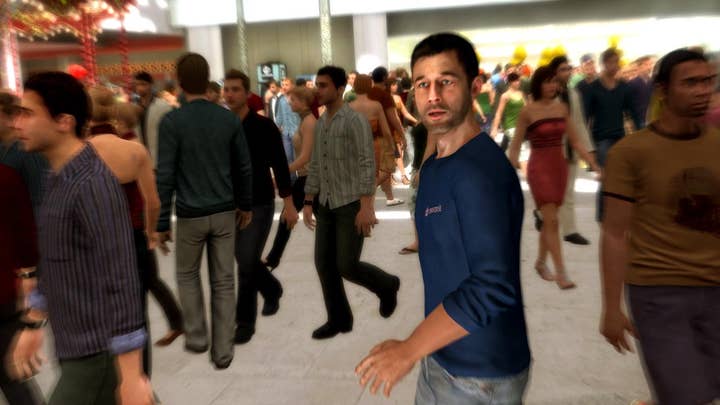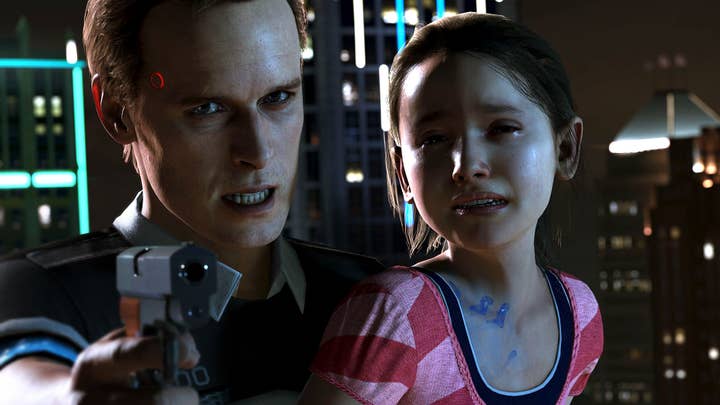Cage: “Games should be about what players feel, not what they do”
The creator of Heavy Rain and upcoming Detroit: Become Human discusses his ongoing quest to share personal experiences through video games
As one of the most divisive games developers in the world, David Cage has a lot to prove every time he announces a new title. For some, games like Heavy Rain and Beyond: Two Souls, are masterpieces of malleable narratives. For others, they are a disappointing maze of quick time events that fail to live up to their promise of true interactivity.
But the Quantic Dream founder, who was recently in London for a talk hosted by the BFI, says this mixed reaction is perhaps the best response to his work.
"Our games are polarising because they're different," he told GamesIndustry.biz. "If we were making first-person shooters, there wouldn't be as much discussion about what we're doing.
"With Fahrenheit, I was pitching a game that would be about interactive storytelling, about emotion, and things that no one thought could be in a game. Emotions? Dilemmas? Moral choices? Why would you want that in a video game? Today, you see emotions in every title - even action games. I'm not saying we invented that, but we believed in something very early on.
"When you do something new, you need to accept the fact that it will be polarising. You'll get a lot of love, and that's amazing, but you'll also have people who don't like what you're doing. And that's fine. I would love to make a game that everyone loves, but at the same time I wouldn't want to compromise and just give the market what it wants. We could all make first-person shooters, but we have a much more exciting industry with people exploring different routes."
"There is more creativity and more courage in the indie world. Sometimes people just dare, and that's so refreshing. That's what I respect the most."
David Cage, Quantic Dream
Those emotional responses are something of a priority when he is planning a new game, as he aims to focus on what players will feel rather than what they will actually do in his games.
"All players are going to press buttons with their thumbs - that's for sure," he said. "But what is interesting is what they're going to feel while they play. And, even more interesting, what they will keep feeling once they've turned their console off.
"There are games that stay with you for years. Just like the books or films you love, they become a part of you. I'm fascinated by the potential for this because games take you to a different place. The player isn't just a spectator, they're the actor of the experience.
"With interactive stories, they're even the writer. The level of immersion is different because they make the decisions, see the consequences and it becomes their story. It's crazy to see how personal it becomes."
Cage tells of a woman he met at a party, who told the developer that Beyond's homeless chapter reduced her to tears. She had been living on the streets herself for two years, and the game "took her back to that time of her life".
"I was so moved by that," he said. "When you're a creator, you can't hope for a more powerful reaction than that. I think there's a tradition in video games that they should be separate from the real world and not talk about real issues, our society and so on. I don't know where that comes from.
"Over the past few years, I see more games creators thinking differently, realising that films, books, poetry - any art form - can talk about those issues, so why not games? Why should we always focus on zombies, monsters or things that are cool but not connected to our world? The industry has been very successful that way, but I think we'll see more creators trying to talk about issues like this. Using interactivity to say something meaningful is very exciting."

Triple-A developers are gradually experimenting in this area, with this year's Deus Ex: Mankind Divided exploring a segregated society and Mafia III taking care to depict the inherent racism of the time period in which it is set. Cage, however, has been more impressed by the indies tackling sensitive subjects with titles such as Papers, Please.
"In the indie world, people are just working by passions, so they don't consider the risks as much," he says. "They can go where very few triple-A developers can go. I'm more interested in the indie world these days, because there is more creativity and more courage there. Sometimes people just dare, and that's so refreshing. That's what I respect the most.
"We're very fortunate. Since we started working with Sony ten years ago, we are in a position to do triple-A games and at the same time talk about different topics."
The storyteller
Perhaps more famous than his quest for emotional responses is Cage's penchant for interactive narratives, stories that diverge depending on players' decisions and actions. In the case of Fahrenheit and Heavy Rain, this is done through multiple playable characters - something Cage particularly enjoys.
"Someone once asked me if having multiple characters in all my games was a sign I'm a schizophrenic - and maybe that's the answer," he laughed. "But I think it's because I really enjoy telling stories from different points of view, and I don't know why other people don't do that as much. Because it's fun, especially when you tell stories that start separately and later interlace."
"Technology is a tool, and should never be more than that. It's the pen to write the book. Sometimes a great pen makes the writing easier, but it won't write for you."
David Cage, Quantic Dream
The challenge of interactive storytelling is that by giving players agency to shape the plot, stronger expectations form as to where that plot will lead. If, as Cage says, the game becomes their story, how can he possibly know how they want it told be told?
"That's my biggest nightmare," he said. "My work as an interactive writer is really strange because I do what most writers do: I imagine a story, then imagine all the possibilities that story might have. It really forces you to explore your story inside out.
"If I was a film writer, I would choose the best one and delete all other options. But with interactive stories, I have to write and implement them all and make sure they're as interesting as the story I think is the best. I also have to make sure players don't fall from one branch to another by chance, I have to make sure it's a logical step and a consequence of their choice so they don't feel cheated. It's a fascinating challenge, but oh my god it's a nightmare."
It's a burden Cage largely takes on himself. While he has the Quantic Dream team at his disposal, the developer is keen to create games and stories that are more personal, and sharing the workload would be somewhat contradictory.
"When you want to write something intimate, something that you have experienced, that can't easily be shared," he explained. "Heavy Rain, for instance, stemmed from this moment where I thought I had lost my kid. It's something we can talk about but if you haven't experienced it yourself, it's difficult to collaborate.
"For me, working in video games is about personal experiences: having a life, loving your children, loving your wife, going out to the park, and being inspired by all these things. Then you try and reinject that into your games and share those feelings with everyone that plays them."

Of course, once Cage has decided what experiences he would like to share and written the script, the rest of the team is brought in to gather feedback and ideas for changes. In this way, the whole of Quantic Dream has a chance to influence his games, but the core remains undeniably his.
"It's a big burden, to be honest," he continued. "I've just finished the script for Detroit. It took me more than two years, and that's working around six days a week. It's probably 20 times more complex than anything we've ever done. It's a lot for one brain to handle.
"Fortunately, I have a very talented team helping me keep track of the branches and finding good ideas for each one. When it's just one brain, you can only have so many good ideas in one day. The fact that it's collaborative work helps me, but I like the fact that it starts with something very personal."
The director
The mechanics of Quantic Dream games may be divisive, but there can be no denying its visual style is nothing short of stunning. Each title pushes the boundaries of realistic human depiction, with Beyond even casting Hollywood's Ellen Page and Willem Dafoe. Is this the key to the game's emotional pull?
"No, I really don't think realism is required to create emotions," said Cage. "You can see that in films and animation - Pixar made us cry over plastic toys.
"What matters most is the story you tell, the characters involved, whether they generate empathy, and if players can identify with them. Realistic rendering worked best with the stories we were trying to tell. But I'd love to work on something that isn't realistic and learn from that."
The visual quality of Cage's digital cast has been bolstered by advancements in motion and performance capture. But the developer insists it's not the technology that is delivering the goods.
"Actors are your vehicle for emotions. The better your vehicle is, the better the emotion - if you manage to create it - will be," he said. "Technology is a tool, and should never be more than that. It's the pen to write the book. Sometimes a great pen makes the writing easier, but it won't write for you."
"Detroit is probably 20 times more complex than anything we've ever done. Fortunately, I have a very talented team helping me keep track of the branches and finding good ideas for each one."
David Cage, Quantic Dream
Cage is also insistent that actors don't necessarily have to come from Hollywood. While Beyond featured the aforementioned Page and Dafoe, the upcoming Detroit currently has no such headliners, and Cage says there's a reason for that.
"I never looked for a face for my games," he said. "I was looking for a creative relationship and talent that could make my game better. I am fortunate that in my career this has led me to work with people like David Bowie, but I wasn't looking for face to put on the cover of the game. I was looking for the right actor to incarnate the role.
"I've worked with actors that were not famous at all but had the talent, and I had exactly the same pleasure working with them. I don't think the gaming audience puts a lot of value on a recognisable face, either. There's a long tradition in this industry where if a game isn't too good, companies put a Hollywood face on it to make it better. I don't think anyone does that anymore because we all know that doesn't work."
The collaborator
That's not to say Cage is averse to working with famous faces again. His experiences with Page, Dafoe and Bowie taught him that newcomers to video games can "bring something totally fresh to the table".
"You're really rewarded because you discover things we've rarely seen before," said Cage. "That was my feeling working with Bowie. He didn't know what video game music was when he started, but he wrote ten songs for the game and about two hours of music, he played two roles in the game and he was brilliant. He did something no one else could have.
"Like everyone else, I was immensely sad [when he passed on earlier this year]. I realise how lucky I was just to have the chance to work with him. It was an amazing experience. He was really a star in the sense that he was accessible, incredibly professional, and very kind. He didn't come with the attitude of 'I'm a star, I'm going to tell you what to do'. No, he said 'You tell me what you want, and I'll do my best'. I found that very impressive.

"When he delivered his songs, he gave me a call and asked what I thought of them. He really wanted to know. I said I loved them. They weren't what I was expecting, but that's what I was expecting from him, to surprise me."
There are still artists and directors out there that Cage hopes to work with someday. When asked who, his answer is broad at first, encompassing "anyone who is talented and truly interested in this medium" rather than those expecting a big cheque.
"It's always a discovery process for me," he said. "I'm learning all the time when I work with people who truly want to bring something new to games, and that's what I enjoy the most.
"I'd love to work with someone like Quentin Tarantino. I think he could do something absolutely amazing in a video game. But there are many, many actors, directors and composers I would love to work with."
